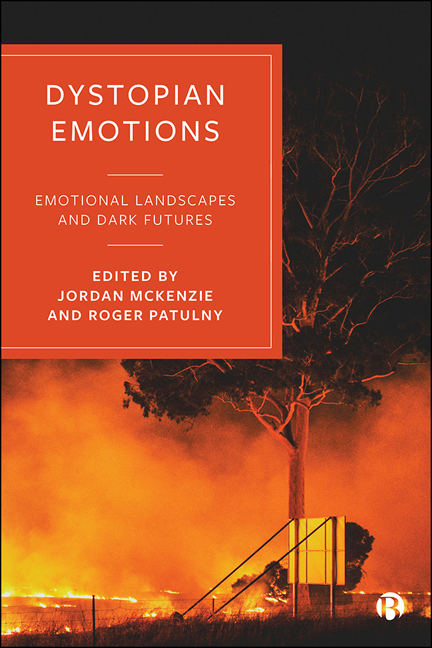Book contents
- Frontmatter
- Contents
- Notes on Contributors
- Acknowledgements
- Introduction: The Feeling of Dystopia
- 1 Borderland Emotions: A Case Study of Youths in Kinmen, Taiwan
- 2 Beyond Wicked Facebook: A Vital Materialism Perspective
- 3 Detangling Online Dystopias: Emotional Reflexivity and Cyber-Deviance
- 4 Mass Emotional Events: Rethinking Emotional Contagions after COVID-19
- 5 Between the Nationalists and the Fundamentalists, Still We Have Hope!
- 6 ‘The New Economy and the Privilege of Feeling’: Towards a Theory of Emotional Structuration
- 7 Neo-Villeiny University
- 8 Resuscitating the Past: Zygmunt Bauman’s Critical Analysis of the Recent Rise of Retrotopia
- 9 Hope Out of Stock: Critical and Melancholic Hope in Climate Fiction
- Conclusion: A Critical Mass of Emotions – Reflexivity, Loneliness and Hope?
- Index
7 - Neo-Villeiny University
Published online by Cambridge University Press: 13 May 2022
- Frontmatter
- Contents
- Notes on Contributors
- Acknowledgements
- Introduction: The Feeling of Dystopia
- 1 Borderland Emotions: A Case Study of Youths in Kinmen, Taiwan
- 2 Beyond Wicked Facebook: A Vital Materialism Perspective
- 3 Detangling Online Dystopias: Emotional Reflexivity and Cyber-Deviance
- 4 Mass Emotional Events: Rethinking Emotional Contagions after COVID-19
- 5 Between the Nationalists and the Fundamentalists, Still We Have Hope!
- 6 ‘The New Economy and the Privilege of Feeling’: Towards a Theory of Emotional Structuration
- 7 Neo-Villeiny University
- 8 Resuscitating the Past: Zygmunt Bauman’s Critical Analysis of the Recent Rise of Retrotopia
- 9 Hope Out of Stock: Critical and Melancholic Hope in Climate Fiction
- Conclusion: A Critical Mass of Emotions – Reflexivity, Loneliness and Hope?
- Index
Summary
Introduction
The pressures of neoliberalism on higher education are abundantly clear (Heller, 2016); manifest in the demands not only for outputs, but outputs that are quantifiably valuable, and are increasingly reliant upon precarious forms of work (Slaughter and Leslie, 1997; Lynch, 2006; Zawadski and Jensen, 2020). Max Weber's (1917) characterization of the American academic as being ‘as precarious as that of any “quasi-proletarian”’ is as relevant, if not more relevant, in 2020 as it was a century ago, and is now applicable to many academic systems outside of the United States. The purpose of this chapter is to consider the university of the [not-too-distant] future. It is an institution marked by the neo-villeiny of staff. Commercial contracts rather than traditional employment contracts are the norm for faculty. Remuneration therein is wholly contingent on satisfactory research output and customer (read student under other circumstances) satisfaction. Under such conditions, and as with the neo-villeins of the fitness industry (Harvey et al, 2017), control of workers is no longer necessary. This is not because of a work environment that inspires organizational commitment and greater levels of effort from staff that perceive some emotional or normative obligation to give more of themselves. Rather, it is one wherein entrepreneurial zeal resolves the indeterminacy of labour power problems (Slaughter and Leslie, 1997).
In this chapter, we begin with a brief summary of the concept of neo-villeiny: highly precarious work that is marked by an absence of a guaranteed wage, payment of rent, bondage to the organization, and extensive work-for-labour (Harvey et al, 2017). Applying the concept to the contemporary higher education sector we observe aspects of neo-villeiny such as the rents paid by academic staff currently ranging from the mundane – for example, car parking – to the more abstract, for example, in the UK where academic outputs (namely academic papers and impact case studies) generate lucrative government funding for ‘their’ institution. Whereas academics aren't bonded to any single university, their occupational identity is predicated upon association with a seat of learning. One might continue to research and write outside of higher education but just as the fitness industry neo-villeins lose access to the resources available in the gym so too does the academic lose access to the most recent scholarship that exists behind a paywall.
- Type
- Chapter
- Information
- Dystopian EmotionsEmotional Landscapes and Dark Futures, pp. 125 - 138Publisher: Bristol University PressPrint publication year: 2021

